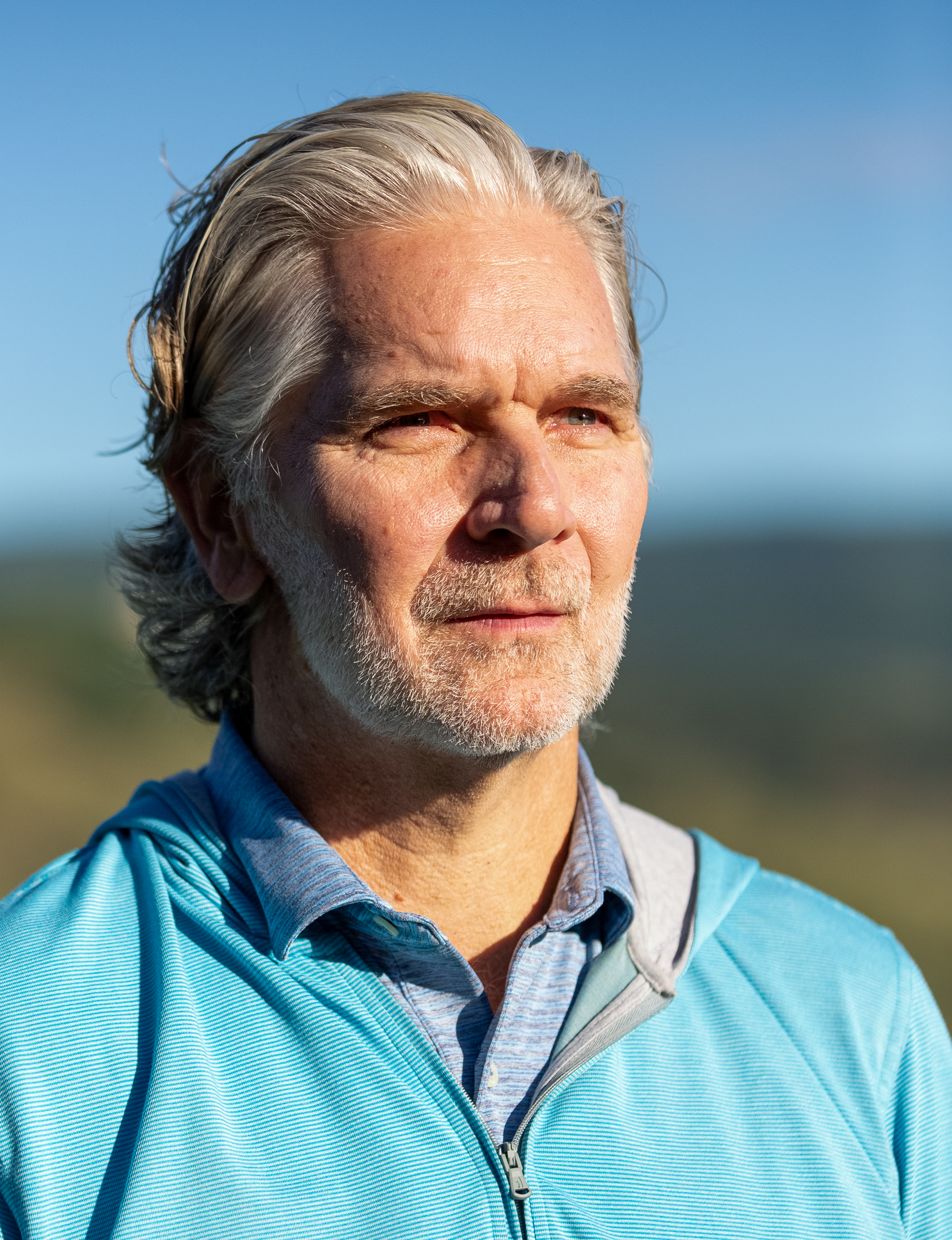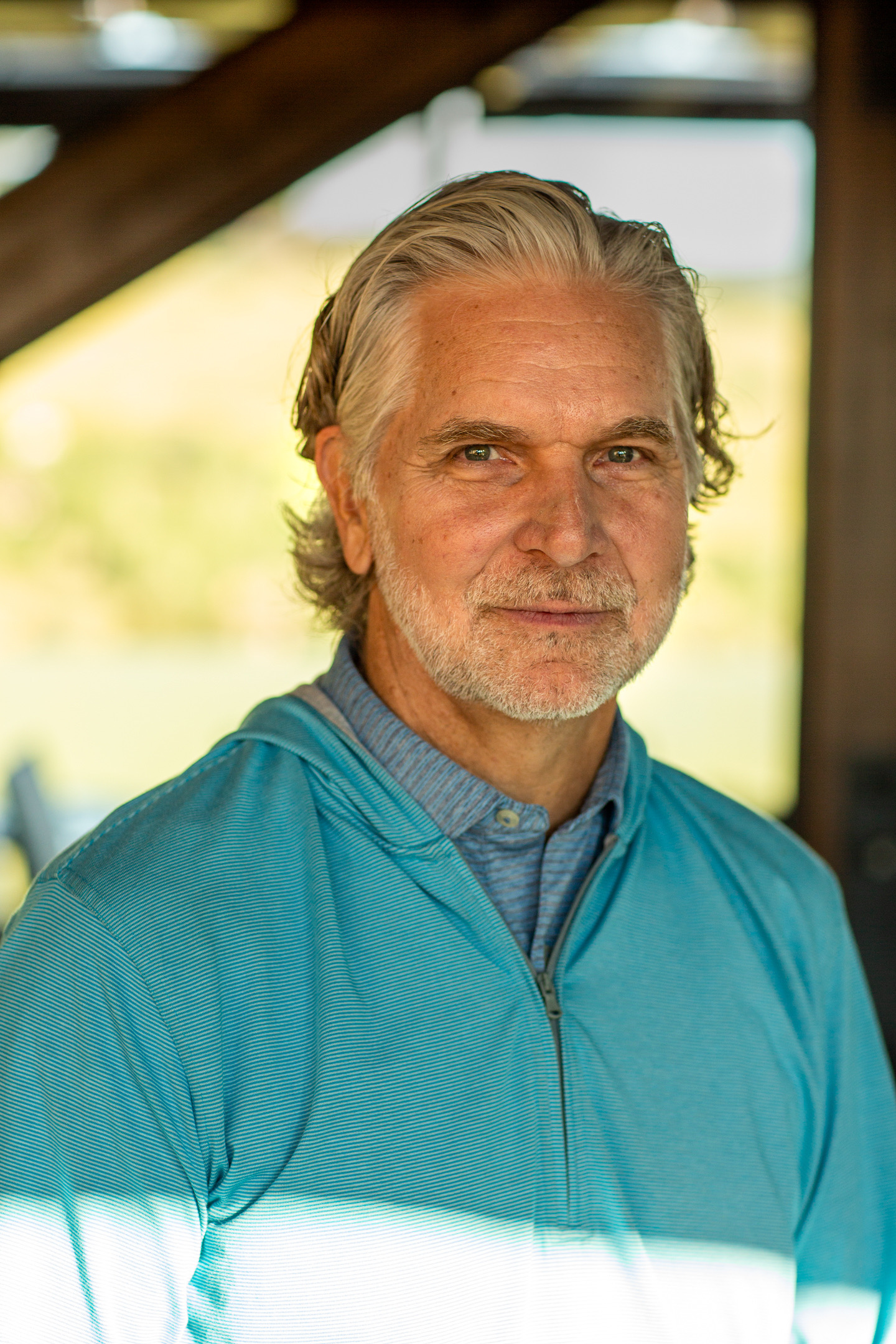Having a rocking career working in a field one loves, complete with accomplishment, recognition and the all-important friendships that come with it, contemplating a transition after almost 30 years of working there can be daunting. Dennis worked his way up the ladder from sales associate to North American VP Sales and Marketing at Dynastar-Lange-Look ski company — an awesomely fun gig. But life is constantly dynamic and we adjust as we go, be it what we eat, how we take care of our bodies and, oftentimes, our work lives.
He’s been working in snow sports for his entire career, and seen many changes since his early days — no more skiing in jeans on straight board skis and diabolically painful ski boots. Today’s gear, with the shaped skis and vastly better clothing, make the mountains much more accessible and fun, especially for people our age.
With Dennis, an incredibly kind and thoughtful man, it is all about helping others improve, be it his team at work, or way back when he was loving teaching adults tennis. With a natural ability to gently transfer skills, mentoring is definitely one of the options on his future radar. The pandemic has seen a massive increase in people’s interest in outdoor sports, which shows no sign of slowing down, and our guess is that Dennis will be out there and be part of it for a long time to come.

What does it feel like to be 58?
Not bad at all. I feel, in relative terms, better for my age than really probably any other time. Now, granted, when I was in my 20s and teaching tennis and bike racing, I was obviously the most fit I had ever been. But as a 20-something-year-old versus as a 58-year-old, I think, relatively speaking, I’m doing pretty well.
So, you were an athlete when you were younger?
Yes, I was fortunate to have a very athletic father and a relatively athletic mother, and was an only child, and they really spent a lot of time with me, either playing sports with me or coming to baseball games or tennis matches. The cool thing that they did with regard to skiing, because they weren’t skiers: their good friends were big skiers, and they finally got us up to their place in Vermont, and I learned when I was nine. My parents would take me 2-3 times a year and drive me to these local resorts, or up to Vermont. They would sit in the lodge and watch me ski. That kind of commitment to me was just amazing.
You have kids, right?
I have two boys, 25 and 22.
So, how did that experience inform your relationship with your boys?
They have always been the priority. Teaching them the various sports was always the high point. I think back to my parents again: anytime I ever asked to go have a catch or go hit the tennis ball or go to the driving range, they would just about drop anything or everything and take me. And so, I tried to do that to the best of my ability with my boys.
I think back to my dad: he would play catch with me until his arm was about to fall off. I remember one day with my younger son, we were throwing the football for about 45 minutes to an hour, and my arm was killing me. I thought: my dad wouldn’t quit. I got to keep going until he said stop.
“I think back to my dad: he would play catch with me until his arm was about to fall off”
What do you learn from your kids?
I like the freedom that this generation has in this willingness to take some risks. And not always taking the conservative path, I guess; easiest way to say it.
Talk to me a little bit about that relationship between you and the people that are decades younger than you who you work with.
Obviously, the younger generation is more in tune with social media, and just a wealth of information that’s online, and identifying different trends.
What I bring to them is 30-plus years of relationships in the industry which, in our business, relationships still go a long way, plus confidence of how I operate, having done it for so long, having made all the mistakes and learning from them and being a little more decisive and also proactive.
So, you’ve had a few transitions in your life. It sounds like you’re planning for another transition coming up at some point in the future here. How do you approach these transitional phases? How do you stay open?
Sure. I would be lying if I didn’t say that the thought of leaving the snow sports industry, which has really been my entire career, worries me. It’s been a big part of my life, obviously my work and professional career. But it’s also where I’ve developed many friendships.
So, I worry a little bit about this industry and this career not defining me. It’s a big part of who I am and I’ve cherished it and enjoyed it. It has been and still is an amazing career, but that transition — whether it’s two years, three years, four years, I’m not quite sure. I’m not sure I want it to end but, at some point, it has to. I’m really interested in committing a little more time to myself, both physically and mentally, and then travel. That’s a big part of what I’m looking forward to.

“I feel about as good as I ever thought I would at this age”
You had a hip operation?
In 2020 in June, I had a complete hip replacement. It was an injury or a situation where it came on slowly and then really accelerated to the point where even walking became painful. I was fortunate to get in during COVID, had it as an outpatient, and it was a complete game changer because not only did it take away all the pain that was in my hip and increase my flexibility, but it helped to alleviate a lot of the low back issues that I had chronically for a couple of decades.
Combine that with a decent amount of weight loss and then a little more time spent on getting flexible and strong. Like I said earlier, I feel about as good as I ever thought I would at this age.
I want to go back to this idea of the transition. I hear this a lot, that work gives us a sense of usefulness and meaning and camaraderie. To go from that to not having that can be really unpleasant. If you were to imagine the future, what would you imagine for yourself in, say, five years or six years?
I think about this gentleman that I used to work with at Solomon, and he recently retired. He, in the wintertime, is a greeter at Park City Mountain Resort and, in the summer, ranger and starter at Soldier Hollow Golf Course, which I think is just to get him out of the house, so he doesn’t drive his wife, who’s still working, crazy. But I don’t know if I’d want to go that route. I’d want to continue to play a more impactful role. Our industry isn’t that big that there’s as much need for people to come in and provide consulting service. But at the same time, it could be fun to work with a startup, a little garage brand or brand that’s maybe outside of snow but within sports or the outdoor industry.
I have this idea that everything is much more digital now, and then, with the oncoming AI revolution, things are going to be even more screen oriented, more digital. But the thing that AI can’t do is fling you down a mountain or have you hit a tennis ball or play golf — anything that’s involved with human physicality. You started skiing almost 50 years ago. There was no digital anything. And now we’re moving in this other thing. How do you see the outdoor sports?
Well, there’s obviously been a huge increase in participation in just about any kind of recreation coming out of COVID. I don’t see it slowing down anytime soon. I almost think that there’ll be the swing back to, maybe not a simpler time, but everything now is so electronic and digital. I think people will want to just get back to 1: outside, and 2: be with other people. I enjoy skiing and I enjoy playing golf. I love it more with friends.
What kind of music do you listen to?
I have a pretty wide and diverse taste in music. I was a 1980s alternative guy in college. So, I still enjoy listening to, like, 1st Wave on Sirius and some of those classic bands like The Cure and Depeche Mode and Echo & The Bunnymen. But I really of late have enjoyed what I guess they’re calling Americana or North Americana music. So, whether it’s Lumineers and Head and the Heart, Lord Huron, bands like that. You can mix in a little bit of not-traditional country, but maybe a little alt country. Big fan of Wilco.
“It goes back to how this [keto] diet makes us feel, and it makes us feel better”
You mentioned you’d lost a lot of weight. What happened there?
Well, I think it was two and a half years ago, New Year’s. We made a New Year’s resolution to try keto. As it happens, you can drop weight pretty quickly with a ketogenic diet. I had been gluten free for close to 16 years. I did that because of inflammation and concern over my back, in particular. And so, to transition from gluten free to keto wasn’t as challenging as somebody that’s doing it cold turkey, because breads and grains weren’t as important.
I know from talking to you and listening to your various podcasts how important it is to have a low-glycemic diet, not just for the obvious weight and just overall health, but to battle against cancer or other things.
It’s working for us. We’re sticking to it. We’ll cheat every once in a while. When we cheat too much, we know and we feel it. It goes back to how this diet makes us feel, and it makes us feel better. I don’t get those midday crashes like I used to. It certainly helps with sleep and just wear and tear on the body; shedding 25 pounds is significant. I’ve gained five of it back, but I’m still under where we started. I’m also significantly under my heaviest in my life. So, I’m feeling pretty good about that.
You mentioned that you play a lot of golf. Tell me what Dennis’ activity life looks like.
Well, on an ideal week, I get up, have some coffee, stretch, do a smaller workout, go to work. Monday through Friday, might sneak out and play nine holes. Kim and I will sneak out and do what we call Wine in 9. We have some wine and hit and giggle and enjoy the cooler evening. I’d love to get out for a mountain bike ride. I’m fortunate that where I live, I can ride from the house and access trails. On the weekend, it would be an early morning ride.
And then in the winter, it’s obviously skiing.
Tell me a little bit about any of the innovations you’re seeing in your industry.
Well, in skiing in particular, the last 25 years, 30 years, the innovation has all been around the ski. Width being the first to give greater flotation, side cut or shape to promote better turning and the carving sensation that only higher-level skiers could really experience in the old, traditional, straight-ski day.
In boots, there really have not been any major innovations. However, this past year, we introduced a new design on the Lange side in a family of boots called Shadow that really changed the paradigm in terms of the interaction of the upper and lower cuff.
The short answer is: this new design features a dual pivot and a suspension blade that work together to create assisted performance. It gives the skier more leverage and more efficiency, so that they can ski longer and stronger with less effort. That’s been a pretty profound advancement in the boot world.
As you look forward, what are the things that you want to learn to do that you don’t know how to do now?
That’s a good question. I would love to learn another language and use that knowledge to travel in that area. I’ve worked for all French companies and I don’t speak French. I’m of Italian heritage and I don’t speak Italian. In my generation, we learned Spanish. I don’t get to use it very much, but it would be fun to go back and take a refresher.
I would say that this wouldn’t be a new skill, but this would be a new application of a skill, and that’s to volunteer with children. One of my early jobs was a teaching tennis professional. I started with the youngest kids, and then worked my way up to teaching both kids and adults. Teaching tennis, and especially the younger children, was really exciting. I’m fortunate that I’m athletic. Whether it’s skiing, golf, tennis or even the team sports, to be able to work with people that don’t know how to play those sports, whether it’s kids or maybe adults, I think might be an exciting way to transition, as you said, and still feel some contribution out there instead of just being selfish.
Connect with Dennis:
LinkedIn
Dynastar
Images by David Harry Stewart.
LEAVE A REPLY
The ideas expressed here are solely the opinions of the author and are not researched or verified by AGEIST LLC, or anyone associated with AGEIST LLC. This material should not be construed as medical advice or recommendation, it is for informational use only. We encourage all readers to discuss with your qualified practitioners the relevance of the application of any of these ideas to your life. The recommendations contained herein are not intended to diagnose, treat, cure or prevent any disease. You should always consult your physician or other qualified health provider before starting any new treatment or stopping any treatment that has been prescribed for you by your physician or other qualified health provider. Please call your doctor or 911 immediately if you think you may have a medical or psychiatric emergency.



Love the ability to live with uncertainty. Seeking and content abiding harmoniously is a gift. Good fortune!
I actually am challenged by “should I stay or should I go”
The Clash